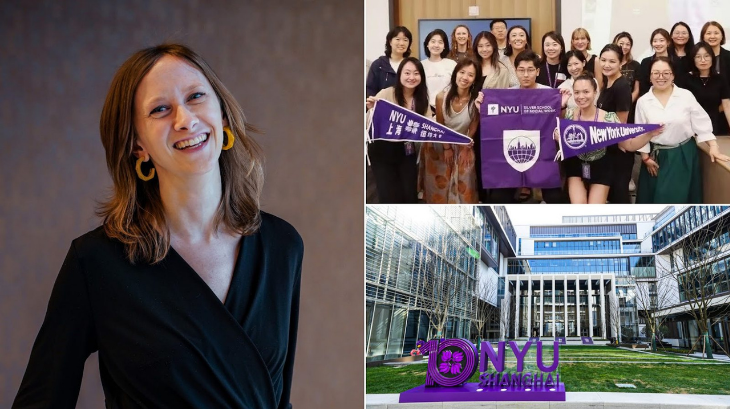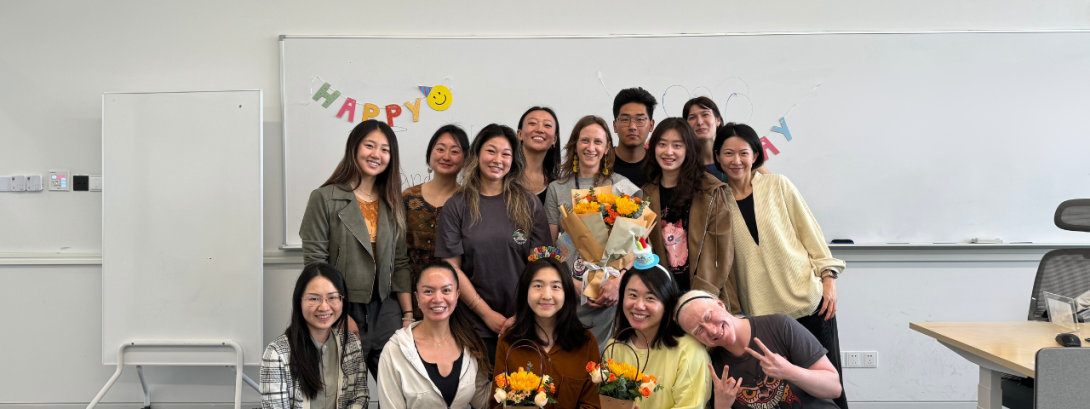“I don’t know if I would be doing exactly what I do now without having studied in NYU’s Shanghai-NY MSW Program, but it completely changed my perspective,” says Carly Siuta, MSW ’19. “It shaped my professional identity, strengthened my ability to work across cultures and gave me confidence in engaging with people from all backgrounds.”
Now the Director of Civic Learning and Social Impact Initiatives at the NYU Changemaker Center in New York, Carly helps students from all over the world create meaningful change on issues and within communities that matter to them.
Carly enrolled in the Shanghai-NY MSW Program after earning her BA in Urban and Public Affairs, working in the nonprofit sector, and serving in both Americorps and the U.S. Peace Corps. “I wanted to get my MSW to better understand different experiences of human development, identity and approaches to strengths-based work,” she said. “I also really wanted to continue working internationally or cross-culturally. I chose the Shanghai-NY MSW Program because it was the only MSW program from a U.S. school that provided that intensive year-long educational experience outside of my home country.”
Students in the program complete the generalist practice curriculum in Shanghai and the specialized practice curriculum in New York City. As a result, Carly said, “they develop adaptability, resilience, and cultural competency that makes them highly marketable—whether they pursue global social work careers or work in diverse settings within their home country.”
While she studied at NYU Shanghai during the 2017-18 academic year, Carly did her practicum placement as a health promotion educator at the Student Health Center. After she completed her MSW in New York the following year, she returned to NYU Shanghai’s Student Health Center as a full-time Senior Specialist for Health Promotion and Student Well-Being. She stayed in that role for nearly five years and also taught in the Shanghai-NY MSW program as an adjunct instructor.
Because she experienced the Shanghai-NY MSW program as both a student and a teacher, Carly has a unique perspective on its strengths and challenges. She shares those insights as a volunteer Silver Champion Admissions Ambassador. She recently answered some of the questions she most frequently hears from prospective students.

Q: What makes the Shanghai-NY MSW Program special?
A: First, it offers intensive cross-cultural learning as a U.S.-based program in the Chinese context.
Second, it’s an opportunity for students to have a true small cohort experience in their first year of MSW study. NYU Shanghai has a small campus, with an even smaller graduate student population. The MSW students take all their courses together. Then, in their final year, they join the larger Silver population and campus in New York. For some students who aren’t sure if they want to be in a smaller or larger program overall this can be a good opportunity to experience both.
Q: Who is the ideal candidate for this program?
A: There are three types of students who thrive in this program:
- Students connected to both China and the U.S. – Whether they have lived in or have family ties to both places, these students benefit from the program’s deep engagement with both cultures.
- Students interested in working in both countries – This program is an excellent fit for those who want to explore careers in social work across China and the U.S.
- Students passionate about cross-cultural work – Students who are interested in working with populations outside of their own culture—whether domestically or internationally—gain valuable skills here.
The one type of student for whom the program may not be the best fit is someone who has a very specific, U.S.-focused career path with a population that shares their culture.
Q: How does the first-year curriculum in Shanghai compare to the one used in New York?
A: The first-year MSW curriculum is very structured so students at both campuses take the same required courses. The big difference in coursework is the integration of Chinese case studies and context in Shanghai.
It is in the second year, in New York, that students start to specialize or take electives. And New York is a really special place. Everybody in the world is there. So I think you get cross-cultural learning in classrooms in New York to some degree as well.
Q: What is student life like in Shanghai?
A: It depends on the student. Particularly for students who aren’t local, it can feel like their life is centered around the NYU Shanghai campus, especially at first. However, practicum placements take students into the city, and many explore Shanghai and other parts of China on weekends and school breaks. The city is highly accessible, even for students without Chinese language skills, with a large international community and an excellent public transportation system.
Q: How diverse is the student cohort?
A: They range from students who have no connection to China at all to students who have only experienced life and education in the Chinese system. But many students are somewhere in between. They may not be from China but they may have studied Mandarin for some time, or have some connection to China, either through family or personal interest. There are also Chinese students who completed high school or undergrad in the U.S. This mix creates a deeply cross-cultural classroom environment where students engage with diverse perspectives daily.
Q: What are the practicum opportunities like in Shanghai?
A: Students who are fully fluent in Mandarin get placed in settings serving the Chinese population. These tend to be clinical settings, which include hospitals, mental health clinics and agencies that work with the elderly. English speaking students are often placed in settings that serve the large, relatively affluent international population. These include therapy practices serving expats and their families and schools.
Q: How does this program help students stand out in their careers?
A: Employers recognize that a year-long, immersive cross-cultural experience is very different from a short-term study abroad program. Beyond technical skills, students gain real-world experience in navigating cultural differences, building trust, and understanding group dynamics, all of which are essential in social work.
Q: Are there particular challenges students experience studying outside of their own cultural context?
A: It’s a pretty common experience for MSW students in general to struggle at first to navigate their practicum placements and figure out their place on the team. So if you add a layer of cultural differences on top of that, it really takes a lot of problem solving, adaptability and communication. I think stepping outside of your comfort zone, and certainly stepping outside of your home culture, is very challenging. But it’s really a boost or accelerator of some of the critical self awareness and self reflection skills that social workers need to have to be effective.
Q: Is there a lot of support from the NYU Silver staff and faculty in Shanghai to help students confront challenges?
A: Yes, and I think the small cohort helps with that. All of the professors and staff know all of the students and they are very accessible for support. There are also excellent support services at the Shanghai campus, including free counseling services, health services, and access to the top-tier private medical and mental health care in Shanghai. And students are well supported in New York as well.
Q: What advice do you have for prospective students?
A: Be open-minded and flexible. Studying in a different culture will challenge you, but that’s an important part of the experience. Some things will feel unfamiliar or even uncomfortable at times, but that discomfort is a crucial part of learning and growing.
This article was originally published by NYU Silver School of Social Work here and is shared with permission.


